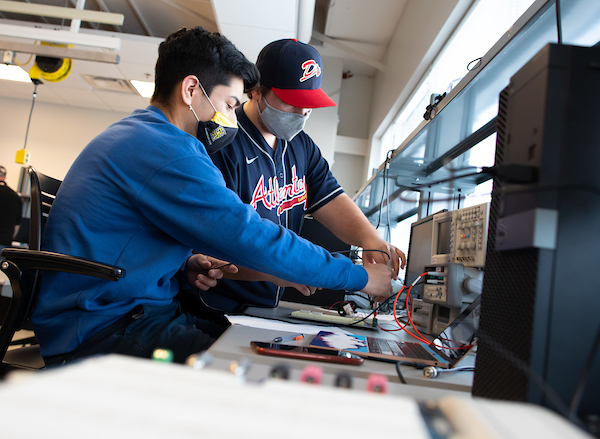Electrical Engineering Technology
Learn more about Electrical Engineering Technology
Admission Requirements
None.
This program does not have specific admission requirements. Only admission to Kennesaw State University is required to declare this major.
General Education Core IMPACTS Curriculum Recommendations for this Major
M: Students should take MATH 1113 or higher.
T: Students should take MATH 1190 or higher.
T: Students should take PHYS 2211/L and PHYS 2212/L.*
* PHYS 1111, PHYS 1111L and PHYS 1112/PHYS 1112L may be substituted for PHYS 2211/PHYS 2211L and PHYS 2212/PHYS 2212L.
Related Minors or Certificates Available
- Engineering Design Graphics Minor
Sample Classes
-
ECET 3400: Data Communications
This course is a survey of data communication topics. The OSI and TCP/IP protocol models are covered, with emphasis placed on protocols associated with the lower layers. Concepts include synchronous and asynchronous transmission, line codes, signaling, effects of bandwidth and noise, and digital and analog modulation. Error detection and correction are also covered. Other areas studied include analog-to-digital conversion, multiplexing, circuit and packet switching, and network topologies.
-
ECET 3810: Applications of C++, JAVA and HTML
A study in the applications of several key programming environments. This course covers such topics as: data types, structures, functions, arrays, file input/output, system calls, data portability, security and Internet related topics as they pertain to the appropriate programming language.
-
ECET 4330: Audio Technology
The fundamentals of specifications, standards, devices, circuits and systems used in audio are studied. Acoustics, power amplifiers, pre-amplifiers, frequency contouring circuits, signal processors, microphones, loudspeakers and sound reinforcement systems are covered.
-
ECET 4530: Industrial Motor Control
This introductory design course is a study of manual and automatic, starters and controllers of ac and dc motors. The course will concentrate on three-phase induction motor starters and controllers with some study of dc motor starters and controllers. The induction motor coverage will include both full-voltage and reduced voltage techniques, with the emphasis on the reduced voltage methods. Line impedance, auto-transformer, wye-delta and part-winding starters will be included. The laboratory will consist of several projects in designing, testing and demonstrating various motor starters and controllers. The designs will require using Programmable Logic Controllers in the projects. The course will conclude with variable frequency drives.












